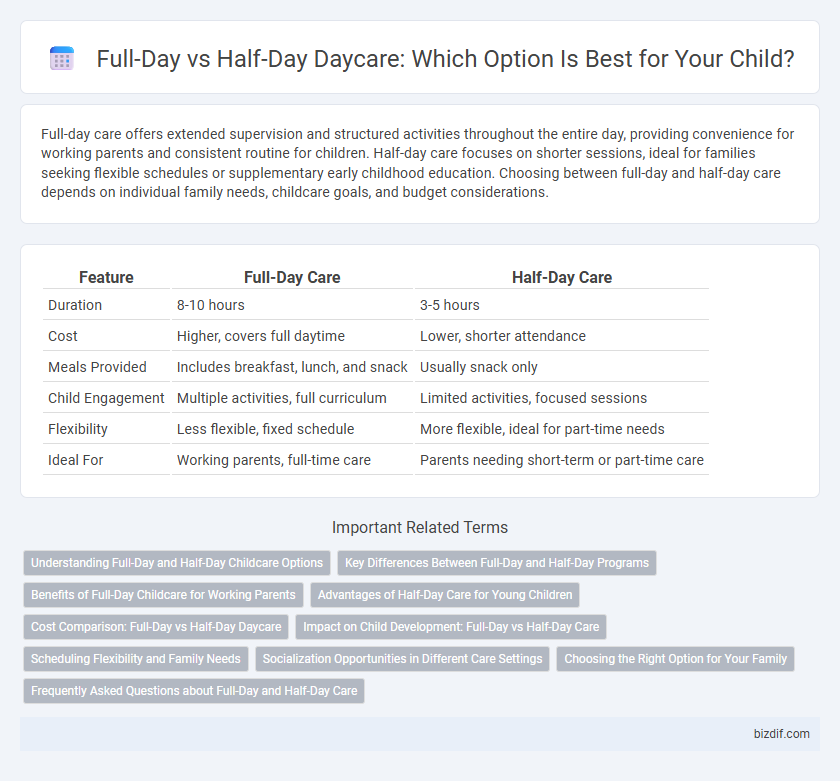Full-day care offers extended supervision and structured activities throughout the entire day, providing convenience for working parents and consistent routine for children. Half-day care focuses on shorter sessions, ideal for families seeking flexible schedules or supplementary early childhood education. Choosing between full-day and half-day care depends on individual family needs, childcare goals, and budget considerations.
Table of Comparison
| Feature | Full-Day Care | Half-Day Care |
|---|---|---|
| Duration | 8-10 hours | 3-5 hours |
| Cost | Higher, covers full daytime | Lower, shorter attendance |
| Meals Provided | Includes breakfast, lunch, and snack | Usually snack only |
| Child Engagement | Multiple activities, full curriculum | Limited activities, focused sessions |
| Flexibility | Less flexible, fixed schedule | More flexible, ideal for part-time needs |
| Ideal For | Working parents, full-time care | Parents needing short-term or part-time care |
Understanding Full-Day and Half-Day Childcare Options
Full-day care typically involves a child attending daycare for six to ten hours, providing extended supervision and activities that support social, cognitive, and physical development throughout the day. Half-day care generally refers to a shorter duration, usually three to four hours, catering to families seeking flexible schedules or part-time arrangements. Choosing between full-day and half-day childcare options depends on parents' work commitments, the child's routine, and the daycare center's curriculum offerings.
Key Differences Between Full-Day and Half-Day Programs
Full-day daycare programs typically run for 8 to 10 hours, providing extended supervision, meals, and structured activities, which support working parents with longer schedules. Half-day care usually lasts 3 to 4 hours and focuses on core educational or social activities without full meal services, making it ideal for families with flexible routines or part-time needs. The main differences include duration, cost, meal provision, and the intensity of programming, influencing child development and family convenience.
Benefits of Full-Day Childcare for Working Parents
Full-day childcare provides working parents with consistent and reliable supervision, allowing them to maintain steady work schedules without interruptions. It supports children's developmental needs by offering extended periods for social interaction, learning activities, and rest, which are often limited in half-day programs. Access to full-day care reduces parental stress and enhances work-life balance, contributing to overall family well-being.
Advantages of Half-Day Care for Young Children
Half-day care programs offer young children a balanced environment that supports early developmental milestones without overwhelming their attention spans. These sessions typically provide structured learning, social interaction, and playtime within a manageable timeframe, promoting better engagement and reduced fatigue. Parents benefit from flexible scheduling and lower costs, making half-day care an attractive option tailored to the needs of preschool-aged children.
Cost Comparison: Full-Day vs Half-Day Daycare
Full-day daycare typically costs nearly twice as much as half-day care, reflecting extended supervision and additional activities. Parents opting for full-day programs often pay between $40 to $60 per day, whereas half-day care averages $20 to $35, depending on location and facility quality. Cost efficiency varies based on work schedules, with full-day care providing greater convenience for full-time working parents despite the higher expense.
Impact on Child Development: Full-Day vs Half-Day Care
Full-day care offers extended opportunities for social interaction, structured learning, and consistent routines, which can enhance cognitive and emotional development in young children. Half-day care provides concentrated periods of focused activities and rest at home, fostering independent skills and family bonding. Research shows that full-day care may better support language acquisition and socialization, while half-day care benefits personalized attention and reduced fatigue.
Scheduling Flexibility and Family Needs
Full-day care offers extended scheduling flexibility, accommodating working parents with longer hours and providing consistent supervision for children throughout the day. Half-day care suits families with shorter schedules or children attending preschool programs, allowing for more focused learning or playtime within a limited timeframe. Choosing between full-day and half-day care depends on balancing family work commitments, child development needs, and daily routines.
Socialization Opportunities in Different Care Settings
Full-day care environments provide extended interaction periods, fostering stronger social bonds and deeper peer relationships among children. Half-day care offers limited social exposure, concentrating on shorter, focused play sessions that develop early social skills but may restrict sustained engagement. The comprehensive socialization in full-day programs supports emotional growth and cooperative behaviors crucial for early childhood development.
Choosing the Right Option for Your Family
Full-day care provides extended supervision and structured activities, supporting working parents who need comprehensive childcare throughout the day. Half-day care offers flexible scheduling and increased affordability, suitable for families with part-time needs or those aiming to gradually introduce their child to social environments. Evaluating your work commitments, child's temperament, and budget helps determine the optimal care duration to foster development and family balance.
Frequently Asked Questions about Full-Day and Half-Day Care
Full-day care typically runs for 8 to 10 hours, providing comprehensive supervision, meals, and learning activities, while half-day care usually lasts 3 to 5 hours, focusing on basic care and early childhood education. Parents often inquire about cost differences, noting full-day care is generally more expensive but offers greater convenience for working families. Common questions address whether children adjust well to longer hours, how meals and naps are managed, and if full-day programs enhance social and cognitive development compared to half-day options.
Full-Day Care vs Half-Day Care Infographic

 bizdif.com
bizdif.com